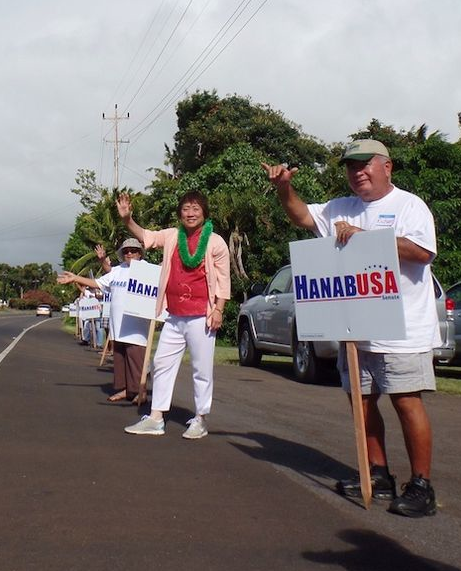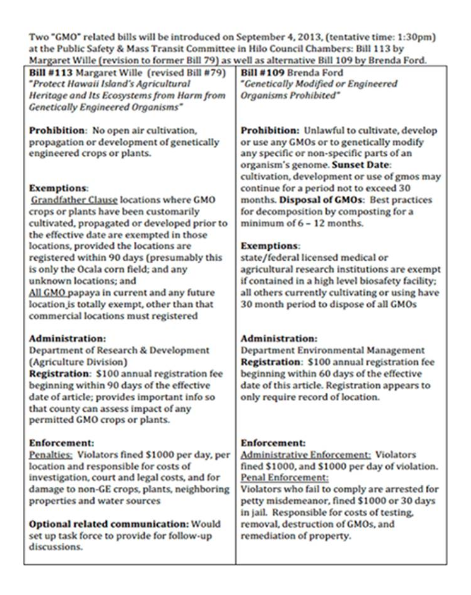NOTE: I do not grow any GMO crops, and I do not have any financial or other affiliation to any large seed or other companies that advocate the use of GMOs. My interest in this topic is in finding the right direction for Big Island farming and in being able to feed our future generations.
The Hawai‘i County Council meets again tomorrow regarding the
anti-GMO bill.
I sent a letter to the editor of the Hawaii Tribune-Herald and West Hawaii Today asking that we take a sincere look at the big picture.
We need to know what we want for the Big Island, and then formulate a plan to get us there.
We need to leverage our resources so as to provide affordable food to the rubbah slippah folks while also working toward achieving food self-sufficiency for future generations.
We need to identify how we can achieve a competitive advantage over the rest of the world.
We need to realize that the Big Island is young, geologically, compared to the older islands. We do not, therefore, have alluvial plains, which form after many years of erosion. We do not have the conditions that would support industrial-scale agriculture – flat land, a dry climate, strong sun energy, deep soil and irrigation.
The seed companies are not arriving here tomorrow to set up shop. Their tractors make money on the straightaways, and they lose money on the turns. It’s counterintuitive, but in spite of its size, the Big Island is an environment best suited for small farmers, not large one. Let’s not let a fear of industrialization cause us to make decisions that kill off our small farmers.
Margaret Wille has now suggested we do an ad hoc study group as part of the Bill 113 discussion. This is an excellent place to begin. Let’s place Bill 113 on hold while we do a fair and impartial study of how we will get from here to there. Who is right is not as important as what is right.
Kumu Lehua Veincent always asks: “What about the rest?” and that is the key question. How do we come to a solution that takes care of the rubbah slippah folks as well as everybody else?
There are a thousand reasons why, No can. We must find the one reason why, CAN!!
Some of my thoughts about all this:
Q. How is farmers’ morale now that Bill 113 is out there?
A. Big Island farmers are demoralized. Paul Harvey narrated a commercial during the last Super Bowl that said, “And on the eighth day, God looked down on his planned paradise and said, “I need a caretaker.” So God made a farmer.
It’s less than a year later, and now Big Island farmers are at risk of being criminalized.
Q. What do farmers think of Bill 113?
A. They feel it is unfair. They feel that they would not be able to use biotech solutions for insect and disease problems in the future, as will their counterparts on the other islands. They feel they would not be able to compete.
Farmers want to be good stewards of the land, and they are very distressed that they might be forced to use more pesticides than the rest of the state’s farmers.
Q. What biotech solutions are being developed for bananas?
A. Resistance to Race 4 Fusarium wilt, the biggest threat right now to banana farming worldwide, and resistance to Banana Bunchy Top virus. Both are taking place at the University of Hawai‘i right now.
Q. What biotech solutions are being developed for tomatoes right now?
A. Resistance to Tomato Spotted Wilt Virus, which could devastate a tomato farm.
Q. As a relatively large farmer, do you think the big seed companies will come to the Big Island?
A. No. They’d lose money, which is why they are not already here. They need flat land, low humidity, high sunlight, deep soil and irrigation. Because the Big Island is so young geologically, these conditions are very rare here. Big tractors make money on the straightaways and lose money on the turns.
Q. Will Bill 113 increase our island’s food self-sufficiency?
A. No. Food self-sufficiency involves farmers farming. If the farmers make money, the farmers will farm. Bill 113 would make Big Island farmers less competitive. So it would result in less food self-sufficiency.
Q. Would Bill 113 result in less pesticide applications?
A. No. It’s biotech solutions that result in fewer pesticide applications. Big Island farmers would have to use more pesticides as compared to the rest of the State.
Q. What do farmers think of registering GMO farms?
A. They worry that this would make it easy for ecoterrorists to locate them.
Q. Hector Valenzuela suggested that organic farmers seek high-end markets. Would that help provide food for the masses?
A. It won’t. That solution anticipates a niche production for people who can afford high prices.
Q. Can organics provide sufficient affordable food for the masses?
A. No. There is no winter here to kill off bugs and provide an automatic reset. There isn’t sufficient manure for compost to provide the nitrogen fertilizer, which is the basic building block for protein.
Q. How can biotech solutions give Hawai‘i farmers a competitive advantage over the rest of the world?
A. They leverage our Hawaiian sunshine, which allows us to grow food year round. Also, reducing the cost of controlling insects and diseases that thrive in the humid subtropics gives Hawai‘i farmers a competitive advantage over the rest of the world.
Q. Do you think GMOs are safe?
A. Yes. Every major scientific organization in the world has endorsed the use of GMOs. Two trillion meals have been served with no harm done. Hawai‘i seniors have the longest life expectancy in the nation.
Q. Do you think RoundUp is safe?
A. Yes.
Q. Why do you think RoundUp is safe?
A. We know that the herbicides we used 25 years ago were much more toxic. Today, we have the ability to detect minute amounts of chemicals, and we must put things into perspective. One could take a sample of sea water and detect gold. But that doesn’t mean we would invest money in a business to mine gold from the ocean. We farmers have been taught, over and over, that the dose makes the poison. We need to use common sense.
Q. In your 35 years of farming, what do you consider to be the most important trend that will affect our future?
A. The price of oil has quadrupled in the last 10 years, which has caused farmers’ costs to rise. Farmers cannot pass on their costs as efficiently as others can. Farmers are price takers, rather than price makers. Because it is a finite resource, the oil price will steadily rise and food price will steadily rise as well.
But we can leverage our sun resource with new biotech solutions. We can take advantage of our year-round growing season and lower our cost to control pests and diseases and therefore lower the cost of food production. This will increase our Big Island residents’ discretionary spending, which makes up two-thirds of our economy. By doing this, we take care of all of us, not just a few of us.
Q. What do you suggest?
A. Defer Bill 113 and form a committee of stakeholders and experts to focus on Big Island solutions to future food security. It should not be political. It should be a solution that takes care of all of us, not just a few of us.


